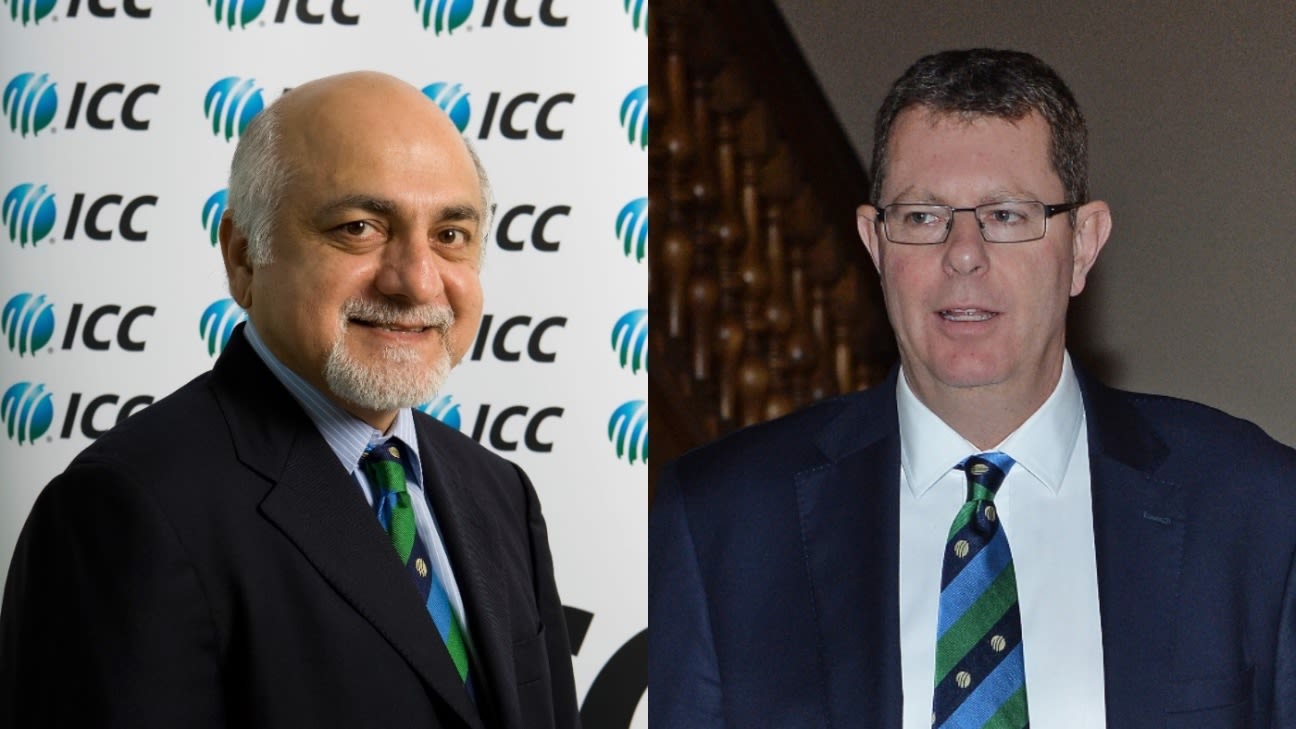Greg Barclay, New Zealand Cricket’s representative on the ICC board, is one vote away from becoming chair of the global governing body, with India’s imprimatur, but the acting chair Imran Khwaja will be able to take the permanent role if he can maintain the current voting deadlock for another two rounds.
ESPNcricinfo has learned that Barclay, the NZC chairman, emerged with a 10-6 majority in the first round of voting held on Wednesday, one short of the 11 votes required for a two-thirds majority and the chair under the ICC constitution. The quirks of the system allow for the incumbent, in this case Singapore’s Khwaja, to hang onto the chair if three rounds of voting pass without a two-thirds majority being reached.
While the voting takes place by secret ballot, Barclay was understood to have entered the process with the backing of the BCCI, Cricket Australia and the ECB – the “big three” bloc that took a controlling financial stake in world cricket’s affairs in 2014 before their changes were walked back somewhat under the chairmanship of Shashank Manohar from 2015 to June this year.
ALSO READ: Three rounds of voting to select new ICC chairman
Khwaja, a long-term representative for the interests of the game’s smaller nations, served as Manohar’s deputy and was the first candidate to emerge in opposition to the ECB’s former chairman Colin Graves, who was forced to drop out of the race earlier this year once his earlier support from the BCCI evaporated due to Barclay’s candidacy and hesitance among other nations.
Having joined the ICC as the NZC representative in 2014, Barclay has earned a reputation as an honest broker and won respect from numerous more seasoned cricket administrators in that time. Nevertheless, some doubts have remained about his ability to “carry the room” as an independent chair given the strong influences of the BCCI, ECB, and CA.
Sourav Ganguly, the BCCI president, has been a notable force in the jockeying for votes, working the phones to discuss matters of the game’s governance with undecided board members. It is unclear which side of the voting divide the ICC’s independent board director, Indra Nooyi, has landed on.
Unsurprisingly, the central conflict so far as votes are concerned has revolved largely around money, and the ability of two contrasting world views to deliver more cash over the next broadcast rights cycle to Member nations.
Khwaja’s position, shared by the experienced PCB president Ehsan Mani and the ICC chief executive Manu Sawhney, is that the staging of as many ICC events as possible, packed up in a long-term broadcast deal, stands the best chance to offer a more significant portion of money to the nations that need it most – essentially all boards other than those of India, England, and Australia.
The opposite view is that bilateral tours, buttressed by the additional context of the World Test Championship and the ODI league, can still provide vital cashflow to all nations involved, balanced out with still frequent but fewer ICC events. There was particular consternation when Sawhney proposed the re-introduction of a Champions Trophy-style event in years not already occupied by ODI or T20 World Cups. By way of a rebuttal, Ganguly has spoken of an annual tournament involving India, Australia, England and one other nation on a rotation basis.
Another tension is that between the ICC board as the game’s peak decision-making body and the striving of ICC management to have a greater say as to cricket’s global direction. This much was made clear in the recent advertising of a new position, that of “vice-president – strategy”.
Its position description includes the following summary: “The role will report to the ICC’s Chief Executive Officer and will be responsible to support in formulating and implementing the ICC’s strategy, with a focus on key critical projects, building the future of the sport, business development and best practices by working closely with key stakeholders.”
This is the kind of modus operandi that the ICC’s Members have long deemed to be the territory of Member chairs in discussion at the board table, rather than a function of management. The ICC’s governance is also under review, in a process led by the CA chair Earl Eddings, after it was commissioned by Manohar shortly prior to his departure.

